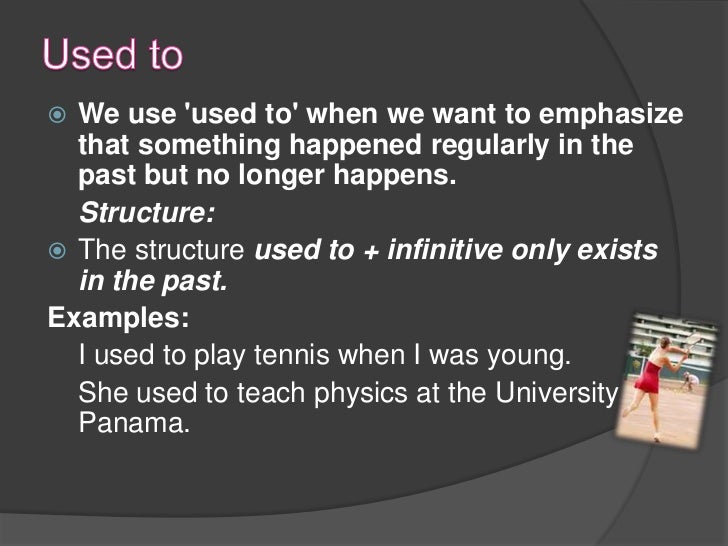Communication English: Customer Service Keywords
Customer Service Keywords for Better Communication
 Customer service keywords:
Customer service keywords:
- I definitely will make sure that it gets sorted…
- I absolutely agree…
- I can certainly help you…
- I understand the inconvenience you have faced….
- I will ensure that…
- What I will do for you right away is…
- I know how frustrating it can be – let’s see how I can help you….
- I would suggest ….
- All you need to do is to….
- I’d be glad to help you today.
- Hold, please.
- Thank you for your patience.
- As much as I’d love to help
- Rest assured.
- I completely understand.
- I’m sorry for the inconvenience.
Customer
- Can I speak to someone else please?
- I’m getting tired of this.
- I realise this is not your fault but…
- Please don’t put me on hold.
- This is a waste of time.
- I appreciate that, but…
- Thanks very much for your help!
I’d be glad to help you today.
Okay, so maybe this looks like a bit of a lie but, when you think about it, this should be your primary goal as a customer service representative! This means that it will make you happy if you can resolve the problem for the customer. This will put the customer at ease and just makes the atmosphere a bit more bearable. Hopefully they believe you and it means that they won’t be shouting and swearing at you. Let’s look at an example dialogue involving this phrase:Representative: Hello Mr Smith, I’m Becky. How can I help you today? Customer: My computer is completely broken, I don’t know what’s happened to it and I really need it to work. I have lots of things to do. Representative: Okay, well I’d be glad to help you today and try to solve that problem! Customer: Great, I really hope you can help me!If you just look at how that dialogue could have gone without the representative saying something nice to start the conversation, it wouldn’t have been productive to either party. It’s a useful phrase for sure.
Could you hold, please?
Ah, this classic phrase. This is the one that we all dread. Customers don’t want to hear it because they don’t want to be waiting and listening to rubbish music! Customers want answers and they want them now! I would imagine that representatives don’t want to have to say this phrase because of the impact it has on the customer, making them angry. But sometimes it’s necessary! Maybe the representative has to go and speak to someone else or attend to another task. It’s so important to remember that neither party knows what is happening on the other side of the phone. Although this is a question, it is often a statement in it’s nature saying I’m going to put you on hold now. Have a look:Customer: I really would appreciate it if you could help me, I’ve been waiting for a long time. Representative: Okay, sir I appreciate your patience and I would really like to help you today. Could you hold, please? Customer: I suppose so, yes, but please I’ve been waiting a long time already!In the past, particularly in America, representatives would say hold, please. and just put you on hold. Whilst that does still happen in places but it is considered rather direct and rude for our modern times. You may hear it if you watch a lot of old films, when the character calls the operator to ask for a connection to someone else, the operator will say hold, please. or please hold. Thank you for your patience. It’s important to thank the customer as well as for the customer to thank you! The customer has spent time and probably money on using the product that you are representing. They need to feel appreciated and wanted by the company or they may never use them again. A great way to retain customers is to treat them as if they are the most important person in the world. Imagine that they have a million things to do and that their time is really valuable to them. This might even be true! Thanking someone for their patience is great because it shows you understand what they are doing in order to try to solve this problem.
Customer: Look, I don’t have time for this, I just want you to solve my problem so I can go about my business! Representative: I understand ma’am, and thank you for your patience. I know your time is very valuable and I will do my best to solve the problem. Customer: Okay, thank you.In all of life’s situations, showing empathy with somebody is important. If they think that you care about them and understand their issue, they are more likely to respond politely and calmly.
As much as I’d love to help…
Uh oh, The time has come where you can’t solve the problem. The customer will not be happy at this news and it will be up to you, the representative, to deal with whatever they say next. I bet if you measured it by the numbers, this would be the phrase that invited the most abuse! With this phrase, as soon as you say it you have to provide a reason as to why you cannot help the customer. It had better be a good one.Customer: It’s not my fault that my kid spilled water on the computer, it should still work! Representative: Well, as much as I’d love to help there’s nothing more I can do. You will have to take it to one of our stores and they will take a look at it. Customer: You haven’t helped me at all. Thanks for nothing!The main piece of advice I have for this one is to be prepared! That’s all you can do. Hey, you tried your best, right?
Rest assured
This is a phrase that can be used in all service positions. It is designed to make a promise to the customer that will make them feel more confident you are going to do what you say you will. Rest assured literally means that the customer can rest, without stressing or worrying, and be assured (confident). When you say this, make sure you can deliver on the promise you are making! Don’t make promises you can’t keep because the customer will know if you don’t deliver! Take a look below:Customer: I just don’t believe that you can solve my problem. I have been on the phone for 2 hours and I still don’t have a solution. Representative: I appreciate your concern sir and please rest assured that I am doing my absolute best to try and solve your problem today. That is my commitment to you. Customer: I’ll believe it when I see solutions!Just be careful with this one, it makes things just a little bit more serious.
I completely understand.
Again, showing empathy with the customer is vital. Whenever I am on the phone with a customer service representative, I can say that this is the phrase I hear more often than any other. This one shows empathy as well, or at least it’s supposed to do so. I have to say when a representative says this to me, I usually don’t believe them. How could they possibly understand without being in the same room and seeing how angry I am?! As a representative, if you can make this at least sound convincing then it will settle the customer down. Just make sure you’re ready for people like me that might not believe it!Customer: This is a really serious problem for me and I just need it fixed please. Representative: I completely understand and I will do my utmost to solve the problem. Customer: You don’t understand! I just need this fixed! Representative: Sir, please bear with me, I was actually in a similar situation about two weeks ago and I know just how stressful and awful it can be.Telling the story at the end of the dialogue might make the customer believe that the representative actually does understand the problem. The story might not be true but it will help get the customer on your side!
I apologise / I’m sorry for the inconvenience.
This is a very important one to remember, if all else fails, just apologise! A lot of customers phone up because they are angry and simply want to have an argument. Some people do not even expect a solution! But of course as a customer service representative, your hands are tied, you cannot respond angrily to an angry customer or you will most probably be fired and the customer will not be happy. Here’s an example:Customer: Look, I missed my plane because it didn’t wait for me. Yes I was late but you people owe me my money back! Representative: I’m sorry sir, but our policy is quite clear here, if you are not at the gate half an hour before takeoff, then we cannot be held responsible. I apologise for the inconvenience. Customer: That’s not good enough. I am owed money and I’m not going to stop asking for it. Representative: As I say, I’m sorry for the inconvenience sir, but there is nothing we can do.It’s your free pass out of a difficult situation! Use it wisely! Okay, so that’s the representative’s phrases, now let’s move onto the customer.
Customer
Can I speak to someone else please?
This is a phrase to use if you are not getting anywhere or perhaps if you have been connected to somebody that doesn’t know what they are doing. Sometimes if you get put through to a different person, you will get what you have been looking for. It’s worth a try! It’s quite a clear one to use but we will show a dialogue just to illustrate the point:Customer: Look, you aren’t helping me at all, can I speak to someone else please? Representative: Sir, I can put you through to someone else if you want but I doubt it will be different. Customer: Yes, I would like you to put me through please.This could be useful if you want to speak to a manager or someone more senior in the company. Get what you want from your phone call!
I’m getting tired of this.
Okay, so you are at the end of your tether, you want your problem solved but the representative will not help you at all. They say it’s your fault and your problem that you are in the situation that you are in! This is a good phrase to use if you want to put pressure on someone to help you. You’re getting tired of this and you want an answer soon or it will turn into a complaint.Customer: Look, I just want answers and all you are doing is apologising. I’m getting tired of this. Representative: I’m sorry to hear that sir, rest assured that I’m doing all that I can.]]>I realise this is not your fault but…
Sometimes we have to remember that this is not anybody’s fault and you should not be arguing at each other. One really interesting thing about this phrase is that it can actually put the representative at ease and make them help you with inside information. Maybe they will give you a tip that they are not really supposed to, maybe they will give you advice to fix issues that you hadn’t heard of before.Customer: Look, I realise this isn’t your fault, but I really want to know if there is anything I can do to fix my computer. I’m desperate for an answer. Representative: Well, I’ll let you in on a secret. We have to say that we can’t do anything about that because this type of damage is not included in our policy, but if you go to the shop and tell them that support have given you a code 3245. They will fix it for you. Customer: Thank you so much!It’s simple! Be kind to people and they will be kind back!Please don’t put me on hold.
To counter what we have already told those representatives in this article we have the request to not be put on hold. You could say that it is pointless to say this (the chances are you will be put on hold anyway) but it’s worth a try!Customer: So, that’s my problem. Can you help me? Representative: I believe I can sir, could you hold please? Customer: Oh no, please don’t put me on hold. I’m sick of being on hold. Representative: I appreciate that sir, but it will only take a second.Worth a try!This is a waste of time.
A more aggressive tactic but it can really get you what you want if expressed in a dignified way. There’s no hidden meaning here, if you want to say that you don’t feel your time is being used well by someone who is supposed to be trying to help you, then use this one.Customer: Please, can you put me through to someone who can help me? Representative: Sorry sir, but all of our representatives are busy right now. Customer: This is a waste of time.Remember this can be slightly inflammatory so reserve it for special situations.I appreciate that, but…
This is very diplomatic language. You are acknowledging that somebody is clearly trying to help you but you still think they are wrong. This a polite phrase to use during an argument to keep things civil with your opponent.Representative: Sorry sir, but all of our representatives are busy right now. Customer: Well is there nothing you can do to solve my problem? Representative: I’m really sorry but I am doing my best sir. Customer: I appreciate that, but I am busy and I have other things to do rather than be on the phone complaining.Thanks very much for your help!
The most important one! Thank people that help you otherwise the world may stop spinning. There is a phrase in English that says manners cost nothing. It’s true you know, and they go a long way. Always say thank you regardless of the service you have received, but in this case if you want to be extremely polite and make the other person happy about what they have done, use this phrase.Representative: I think I have found a solution. Reset the device for 5 seconds and your problem should be solved. Customer: That’s fixed it! Thank you. Representative: You’re welcome! I’m glad to help. Is there anything else I can help with today? Customer: No, that’s everything. Thank you very much for your help! Representative: You’re welcome, have a good day! Customer: You too!Remember that customer service people take a lot of abuse. You don’t get people phoning customer service so that they can talk about how happy they are with a product. The phone numbers exist so that people can complain about issues. It’s a hard job but someone’s got to do it! So, rest assured I have done all I can to explain these phrases to you today and I completely understand that it can be difficult to digest a lot of vocabulary. Thank you very much for taking the time to read this article and feel free to add all comments and questions below! Giving your opinion in English There are so many ways to express an opinion in English and it’s important that you use them. The way you choose to express an opinion can alter the way people think of you and look at you every day! This is especially true in British English, where we are obsessed with politeness and not being too assuming. So here we have a great list of phrases to give your opinion!Probably the most basic way we have here of expressing your opinion. Using in my opinion is a great way of telling people what you think and also making sure they know that it is just your opinion. You could use this during a debate or if you are with a group of people deciding what they should do.
- In my opinion/In my humble opinion
- I reckon/suppose
- I know
- May I?
- If you ask me
- If I were you
- To be honest
- I could be wrong, but
- I’m no expert, but
- Personally
- In my opinion/in my humble opinion
Alan: Hey Steph, what did you think of the new Terminator film? Steph: Well, in my opinion, it wasn’t as good as the older ones. I didn’t find the story line believable. Alan: Yeah true, it was strange.To add something to this phrase you can add the word humble that changes the meaning just slightly. Saying in my humble opinion adds a bit of politeness to expressing your opinion. To be humble means that you act in a very reserved and careful manner so that you don’t offend people. Servants were always expected to be humble when they were working for kings and queens. It is slightly degrading and lowers your own worth, but today it is also used to be polite.Alan: So you really didn’t like the movie then? That’s a shame. Steph: No, I just thought it was nowhere near the old films. But that’s just my humble opinion!Use these with new English acquaintances to impress your friends with how polite you are!These are ways to express opinion with a slight sense of uncertainty as well. Using I reckon in a sentence is primarily reserved for British English and southern US English. It’s a very personal thing to say and because of that it implies that the opinion is not an expert one. It is simply that person’s view.
- I reckon/ I suppose

 10. STEP UP YOUR GAME: to start performing better
10. STEP UP YOUR GAME: to start performing better
 19. HANG IN THERE: wait and be patient
19. HANG IN THERE: wait and be patient
 32. A BAKER’S DOZEN: thirteen
32. A BAKER’S DOZEN: thirteen
 46. HIT THE BOOKS: to study very hard
46. HIT THE BOOKS: to study very hard

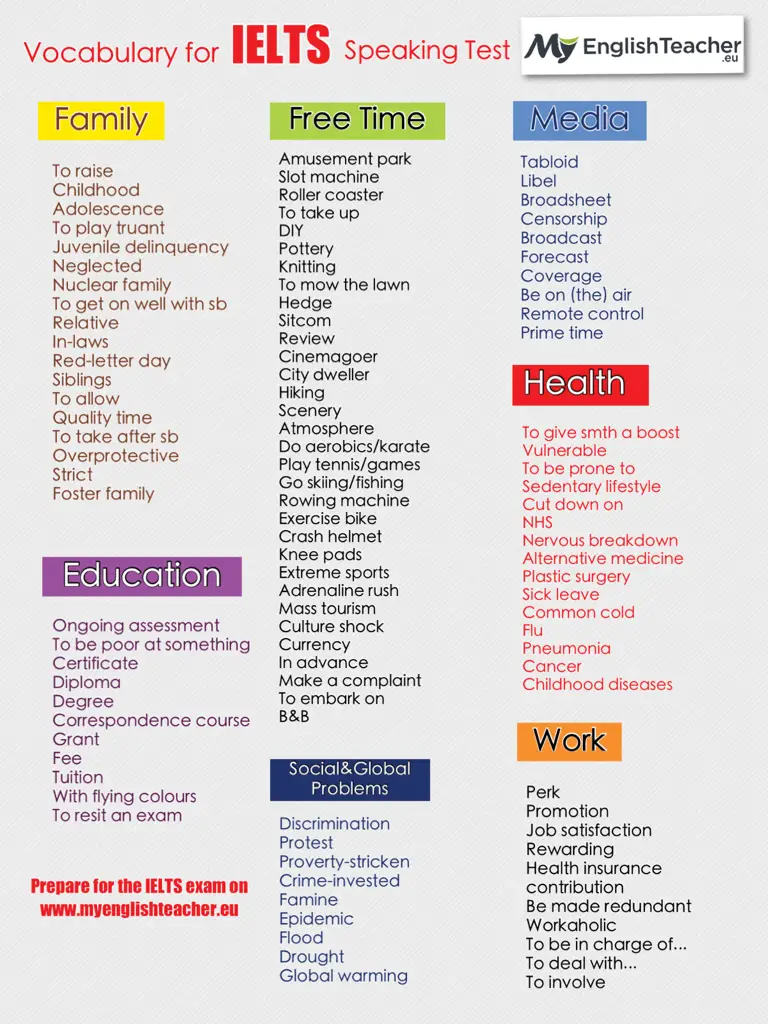 I for Imaginative
E for Excellent
L for Laid-back
T for Tuned-in
S for Smart.
Look at each word above and see how many SYNONYMS (words with the same meaning) can you think of?
Not many? It’s time to learn some new words and to revise the old ones. By the way, ’revise’ has a synonym I love: BRUSH UP. When I hear this word, I always visualize a large brush scrubbing my brain cells.
OK, let me give you a few examples:
I for Imaginative
E for Excellent
L for Laid-back
T for Tuned-in
S for Smart.
Look at each word above and see how many SYNONYMS (words with the same meaning) can you think of?
Not many? It’s time to learn some new words and to revise the old ones. By the way, ’revise’ has a synonym I love: BRUSH UP. When I hear this word, I always visualize a large brush scrubbing my brain cells.
OK, let me give you a few examples:
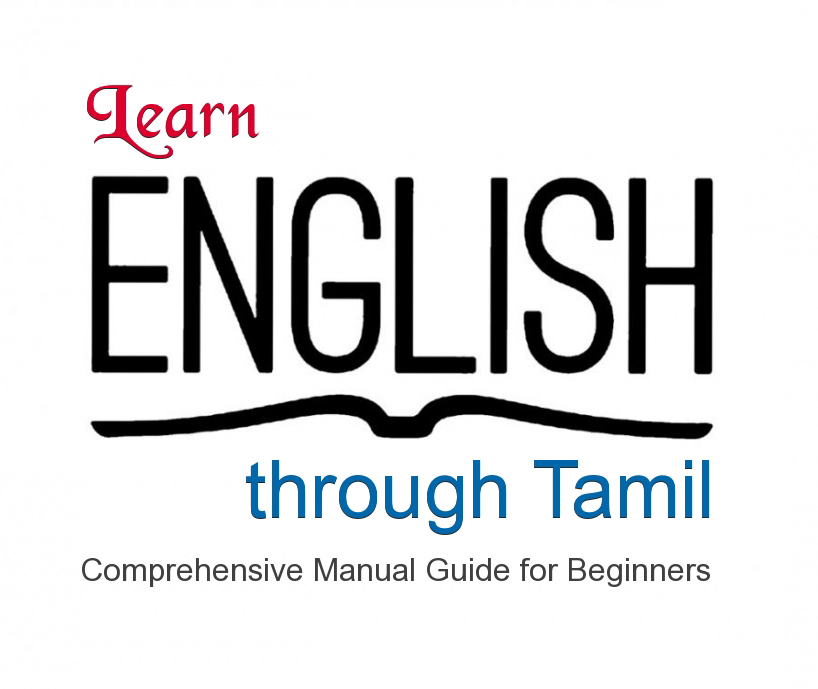


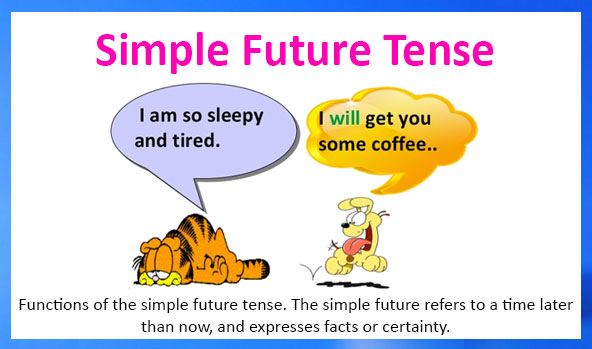



 We use the Past Perfect Continuous to show that something started in the past and continued up until another time in the past. “For five minutes” and “for two weeks” are both durations which can be used with the Past Perfect Continuous. Notice that this is related to the
We use the Past Perfect Continuous to show that something started in the past and continued up until another time in the past. “For five minutes” and “for two weeks” are both durations which can be used with the Past Perfect Continuous. Notice that this is related to the  Past Continuous vs. Past Perfect Continuous
Past Continuous vs. Past Perfect Continuous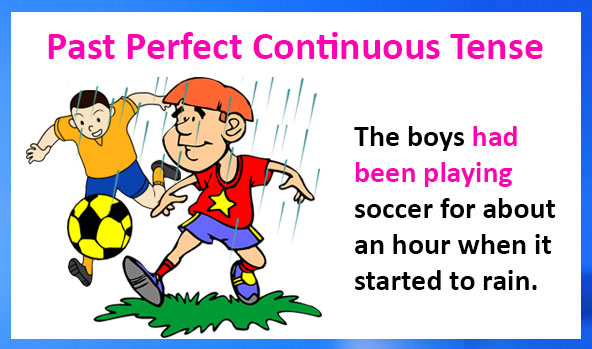
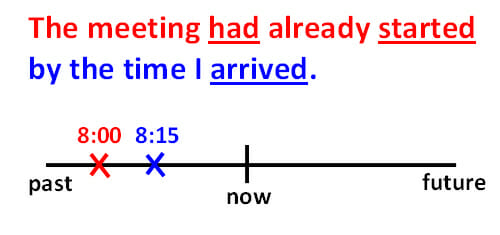 The first auxiliary verb (have) is conjugated in the Past Simple, invariable: had
The second auxiliary verb (be) is invariable in past participle form: been
The main verb is invariable in present participle form: -ing
For negative sentences we insert not after the first auxiliary verb.
For question sentences, we exchange the subject and the first auxiliary verb.
Look at these example sentences with the Past Perfect Continuous tense:
The first auxiliary verb (have) is conjugated in the Past Simple, invariable: had
The second auxiliary verb (be) is invariable in past participle form: been
The main verb is invariable in present participle form: -ing
For negative sentences we insert not after the first auxiliary verb.
For question sentences, we exchange the subject and the first auxiliary verb.
Look at these example sentences with the Past Perfect Continuous tense:

 The Past Perfect expresses the idea that something occurred before another action in the past. It can also show that something happened before a specific time in the past.
The Past Perfect expresses the idea that something occurred before another action in the past. It can also show that something happened before a specific time in the past.



 Unlike with the
Unlike with the 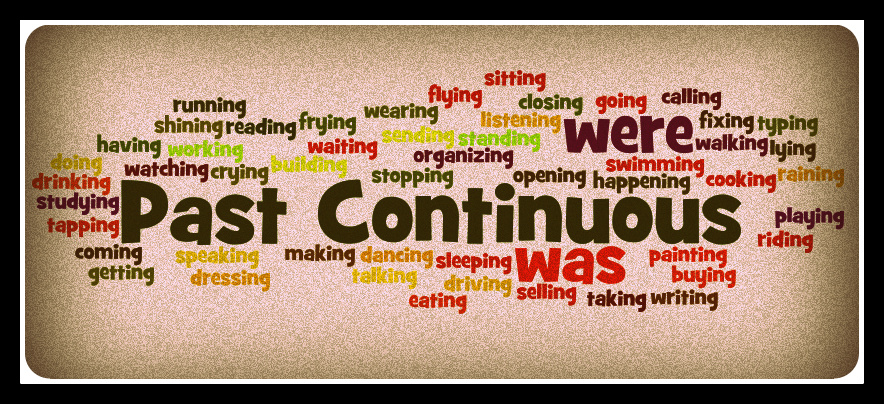

 Use the Past Continuous to indicate that a longer action in the past was interrupted. The interruption is usually a shorter action in the Simple Past. Remember this can be a real interruption or just an interruption in time.
Use the Past Continuous to indicate that a longer action in the past was interrupted. The interruption is usually a shorter action in the Simple Past. Remember this can be a real interruption or just an interruption in time.
 When you use the Past Continuous with two actions in the same sentence, it expresses the idea that both actions were happening at the same time. The actions are parallel.
When you use the Past Continuous with two actions in the same sentence, it expresses the idea that both actions were happening at the same time. The actions are parallel.
 The Past Continuous with words such as “always” or “constantly” expresses the idea that something irritating or shocking often happened in the past. The concept is very similar to the expression “
The Past Continuous with words such as “always” or “constantly” expresses the idea that something irritating or shocking often happened in the past. The concept is very similar to the expression “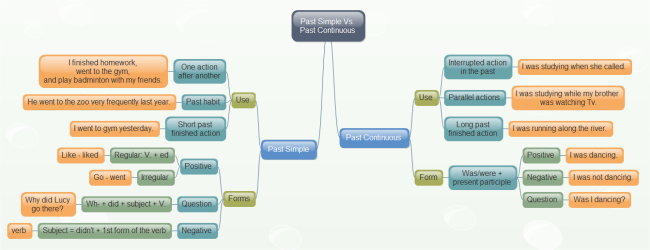

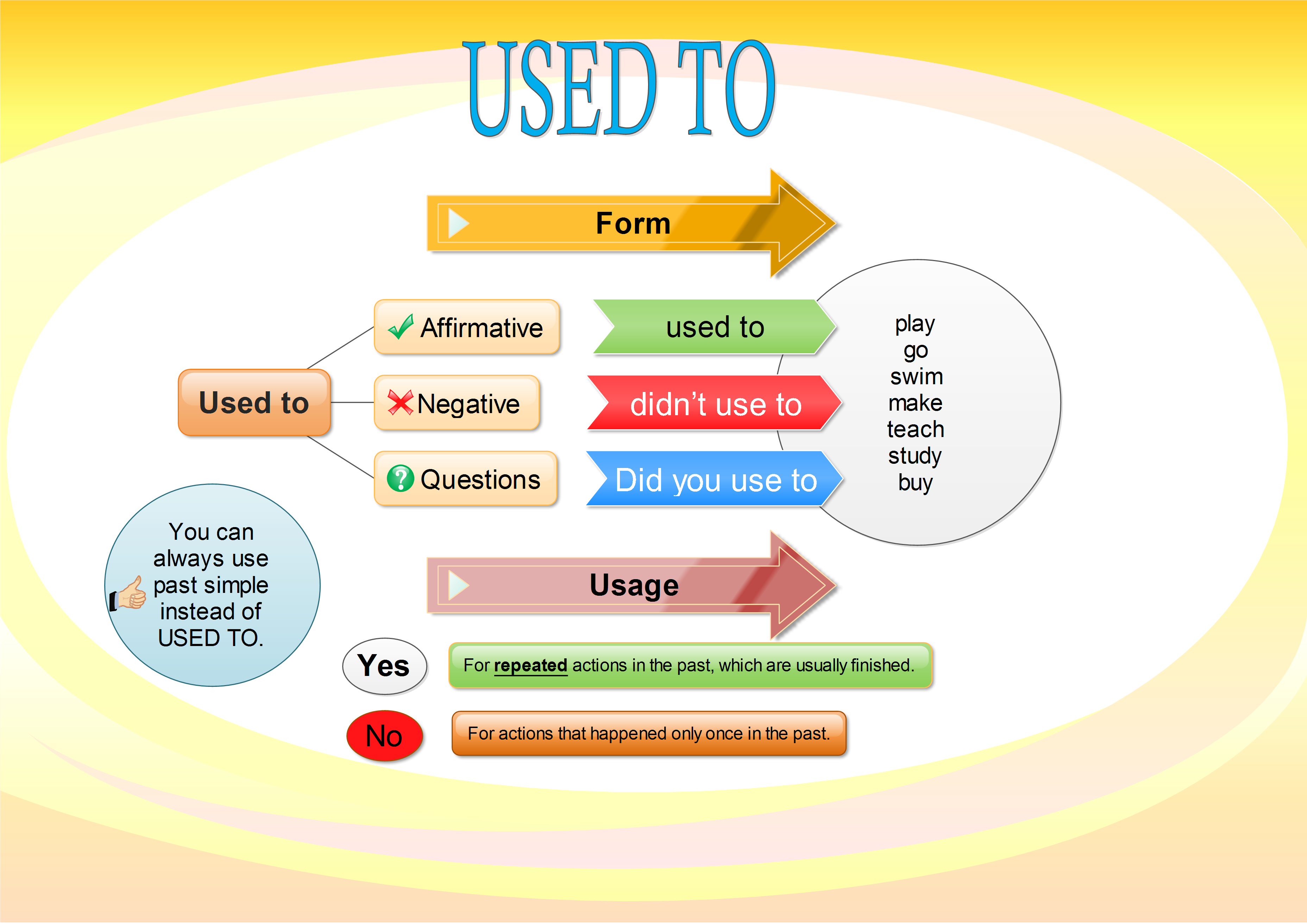
 “Used to” can also be used to talk about past facts or generalizations which are no longer true.
“Used to” can also be used to talk about past facts or generalizations which are no longer true.
